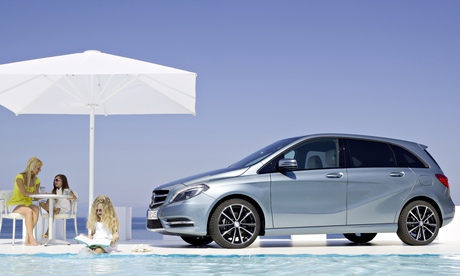
What do Mercedes-Benz and my old history teacher Mr “Hefty” Heftner have in common? Quite a lot as it turns out. Both are German, both have a rich sense of heritage and both have evolved novel ways to keep you awake. One uses feedback from 70 sensors placed invisibly around you to produce auditory and visual stimuli to stop you dozing off, the other throws a chalk duster at your head. Both methods are extremely effective. You’ll find it difficult to nod off at the wheel of a Merc, and we were all too terrified to fall asleep in O-level history.
Mercedes has been at the forefront of safety innovation for decades. It put the crumple zone into production as long ago as 1951 and its anti-lock braking system (ABS) has been with us since 1970. Another industry first is Attention Assist. You don’t have to be a genius to realise that falling asleep at the wheel is probably the fastest way to test your crumple zone, but that hasn’t stopped the boffins from checking it. It’s a research programme that can’t have yielded many surprises – “Yes, Jürgen, it was just after you fell asleep that you crashed!” Indeed they found that between a quarter and a third of all motorway accidents are caused by driver fatigue. Amazing!
So this is where Attention Assist comes in. From the moment you start driving, your Mercedes keeps an eye on you. Using input from 70 sensors it creates a unique template of your driving style on that particular day. As your journey continues, it constantly monitors you to see how you are measuring up to that first impression. The heart of the system is the steering wheel. Tired drivers make dozens of tiny errors that they then correct immediately. If you start doing this, Attention Assist will check to make sure you are actually feeling sleepy by asking itself a series of questions: how long have you been at the wheel; are you listening to the radio; are you fiddling about with the car’s controls; is the road pot-holed; are you being buffeted by a side wind? If the answer to these is not as expected, the system presumes you must be nodding off and the car emits an irritating beep and flashes a picture of a cup of coffee at you.
I tried it out in the new B-Class I was driving last week. I tried to fool the clever little car by starting out feeling totally knackered and thus creating a dodgy initial template. It saw through that and soon started beeping at me. Another time I pretended to drive like an exhausted person. Veering about, slamming on the brakes, nodding my head like a fat man at a Shakespeare matinee… The car saw through my wheeze and did nothing. More worryingly my wife didn’t make any comment either. She said my driving had seemed no worse than usual. I didn’t go as far as just closing my eyes… but even then a crash would have been tricky as the car’s radar-controlled Collision Prevention Assist Plus equipment would have autonomously slammed on the brakes, while the Merc’s Pre-Safe system would have tightened the front seat belts, adjusted the front head restraints and closed the windows and sunroof to ensure the best outcome from a smash.
Safety gets a big tick in this small Benz. But then what did you expect from the upmarket B-Class? This latest update to the model also comes with sharper looks, more technology and a choice of engines: two petrol and four diesels. Handling is as precise as ever and the drive is calm, reassuring and soothing… No wonder they’re worried you might drift off.
New month, new car
According to the website HonestJohn.co.uk, March could be your best month for buying a new car in years. A perfect combination of factors means it’s certainly worth having a look, as low borrowing costs, low fuel costs and a boom in new models could result in a bargain for you. Research by Honest John shows that the typical APR for car finance has dropped by more than 3% over the past four years. At the same time, the number of high-street lenders offering finance deals has increased dramatically. The reason for this is that the price of borrowing is low – with the UK base rate of 0.5% finally filtering down to car buyers. March will also see many consumers buy new cars fuelled by the low cost of petrol. Compared to last year, a typical petrol hatchback owner will spend, on average, £200 less a year on fuel. Insurance costs are also at their lowest in years thanks to savings from an increase in car safety technology, eg autonomous emergency braking, and insurers clamping down on fraud. Finally Ford, Skoda and Volkswagen are all releasing their 2015 ranges this month. So, get yourself down to your local showroom and start the spring with a new set of wheels.
Motorbike kit from Aldi
Next time you pop into Aldi for your weekly groceries, you might also want to check out their new range of affordable gear for motorcyclists. As you would expect, the price is startlingly low, but what you might not have appreciated is just how good the kit is. Aldi’s motorcycle jacket (£79.99) and trousers (£59.99) are both CE 2 certified, offering a high level of protection. On top of that there’s a stylish neckwarmer (£2.99), thick socks (£3.59), gloves (£19.99) and boots (£29.99). All well worth a look, if you want your money to go further. For more details, go to Aldi special buy events.
Email Martin at martin.love@observer.co.uk or follow him on Twitter @MartinLove166
Follow the Observer Magazine on Twitter @ObsMagazine

